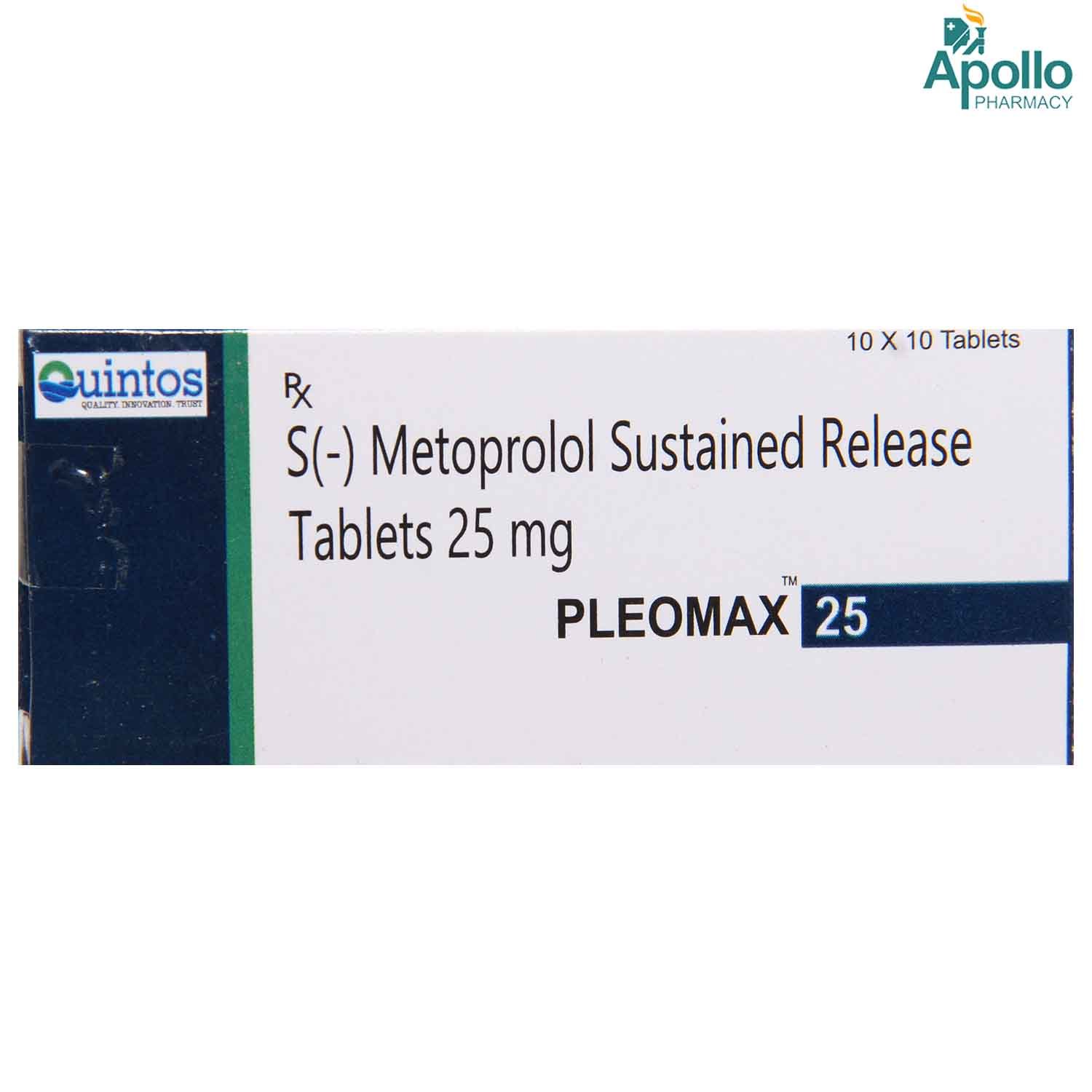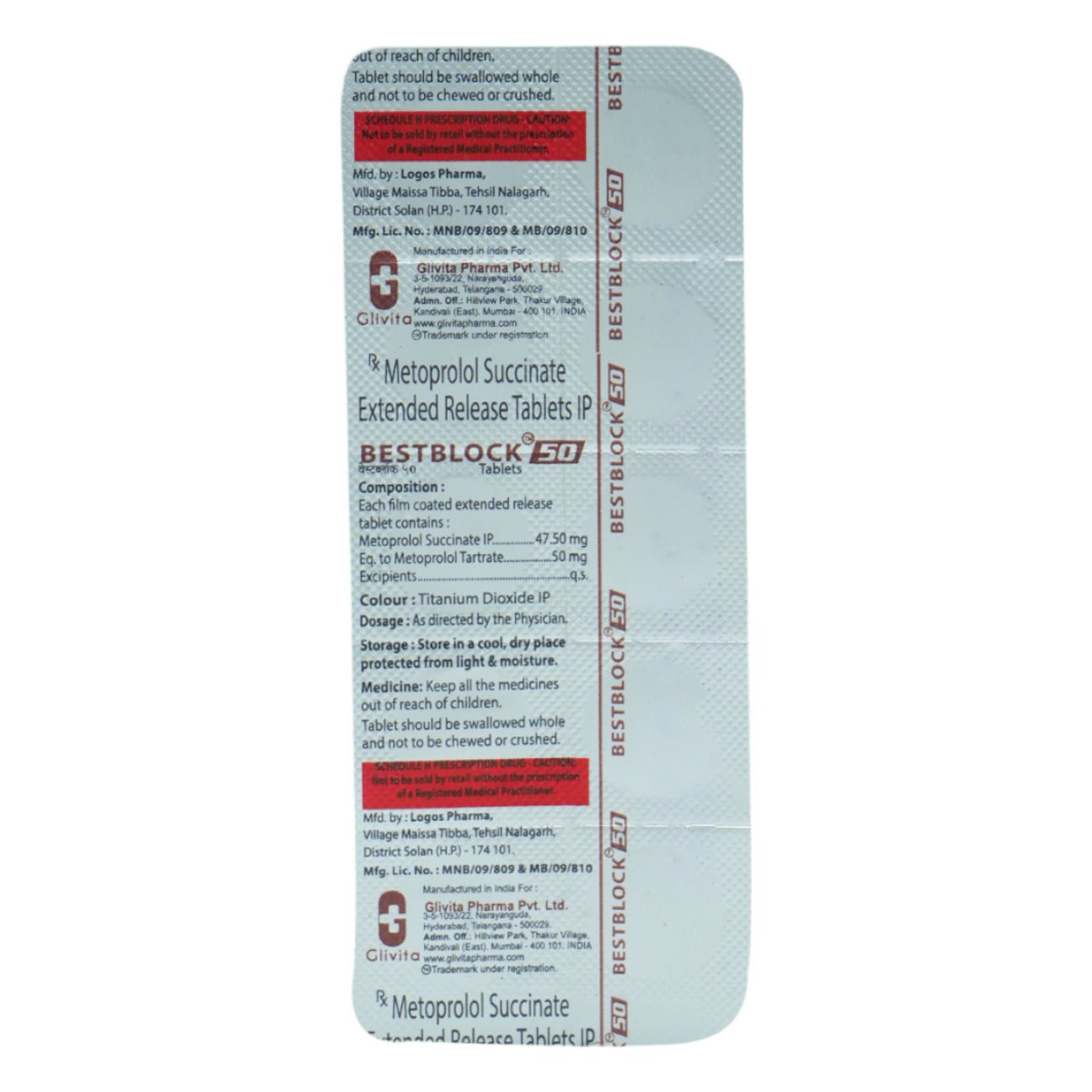Metoprolol Tartrate
About Metoprolol Tartrate
Metoprolol Tartrate is used to treat hypertension (high blood pressure), angina (chest pain), arrhythmia (irregular heart rhythm), and myocardial infarction (heart attack). Besides this, it is also used to prevent migraine and heart damage after a heart attack.
Metoprolol Tartrate contains Metoprolol tartrate, which works by relaxing blood vessels. It helps slow down the heart rate, making it easier to pump more blood around the body. Thereby, it treats high blood pressure and reduces the risk of heart problems.
In some cases, Metoprolol Tartrate may cause side effects, such as tiredness, dizziness, stomach pain, and nausea. Most of these side effects do not require medical attention and gradually resolve over time. However, if the side effects are persistent, reach out to your doctor.
Do not take Metoprolol Tartrate if you are allergic to any of its components. Consult your doctor if you are pregnant or breastfeeding. Keep your doctor informed about your health conditions and medications to prevent potential interactions.
Uses of Metoprolol Tartrate
Medicinal Benefits
- Metoprolol Tartrate helps treat high blood pressure by relaxing the blood vessels and improving blood flow.
- It slows down the heart rate and reduces the force of each heartbeat.
- By controlling blood pressure, Metoprolol Tartrate helps reduce the risk of stroke, heart attack, and kidney damage.
- Metoprolol Tartrate decreases the heart’s oxygen demand by reducing heart rate and cardiac workload. This helps relieve chest pain and improves exercise tolerance in patients with angina.
- By regulating electrical signals in the heart, Metoprolol Tartrate helps normalise heart rhythm, especially in conditions like atrial fibrillation or supraventricular tachycardia.
- Metoprolol Tartrate reduces the heart’s workload and oxygen demand, helping to prevent further heart damage and lower the risk of complications post-heart attack.
- It is effective as a migraine prophylactic, helping to reduce the frequency and severity of migraine attacks by stabilising blood vessels and nervous system activity.
Directions for Use
- Metoprolol Tartrate can be taken with or without food, or as advised by the doctor.
- Follow your doctor’s recommendation regarding the dosage and timing.
- Swallow the tablet as a whole with a glass of water.
- Do not chew, crush, or break it.
Storage
Side Effects of Metoprolol Tartrate
- Tiredness
- Dizziness
- Headache
- Stomach pain
- Diarrhoea
- Nausea
Drug Warnings
- Do not take Metoprolol Tartrate if you are allergic (hypersensitive) to metoprolol tartrate or any ingredients present in it.
- Please consult your doctor before taking Metoprolol Tartrate if you are pregnant or planning to conceive, or breastfeeding.
- Metoprolol Tartrate is not recommended for use in children.
- Inform your doctor if you have diabetes mellitus, liver cirrhosis, myasthenia gravis, psoriasis, or if you have a slow heart rate or blood vessel disorder.
- Do not take Metoprolol Tartrate with medicines like monoamine oxidase inhibitors (MAOIs) for depression, other blood pressure-lowering medicines such as nifedipine, verapamil, diltiazem, disopyramide or quinidine (to treat irregular heartbeat).
- Get up slowly from a lying position, as Metoprolol Tartrate may cause dizziness and fainting if you stand up suddenly.
- Alcohol may increase the blood pressure-lowering effect of Metoprolol tartrate; hence, avoid consuming alcohol during treatment with Metoprolol Tartrate.
- Inform your doctor about all your current ongoing medications before taking Metoprolol Tartrate.
Drug Interactions
Drug-Drug Interactions: Metoprolol Tartrate may interact with other blood pressure medications (acebutolol, atenolol, bisoprolol, carteolol, esmolol, metoprolol, nadolol, nebivolol or sotalol), medicines for treating depression (isocarboxazid, linezolid, phenelzine, rasagiline, selegiline, tranylcypromine), an ergot medicine (dihydroergotamine, ergonovine, ergotamine, methylergonovine), high blood pressure medications such as hydralazine, clonidine or prazosin; stomach ulcers medication such as cimetidine; epilepsy medication such as barbiturates; malaria medication such as mefloquine.
Drug-Food Interactions: Metoprolol Tartrate may interact with alcohol, grapefruit and protein-enriched foods.
Drug-Disease Interactions: Metoprolol Tartrate is not recommended for people with heart rhythm problems, diabetes, liver or kidney disease or failure, or COPD (Chronic Obstructive Pulmonary Disease).
Drug-Drug Interactions Checker List:
Safety Advice

Alcohol
unsafeDrinking alcohol may increase tiredness, lower blood pressure, causing dizziness or drowsiness. So avoid its intake with Metoprolol Tartrate.

Pregnancy
cautionMetoprolol Tartrate is not recommended during pregnancy unless your doctor considers it essential. Your doctor will weigh the benefits and any potential risks before prescribing it to you.

Breast Feeding
cautionMetoprolol Tartrate is not recommended if you are breastfeeding unless your doctor considers it essential. Your doctor will weigh the benefits and any potential risks before prescribing it to you.

Driving
unsafeYou may experience dizziness, tiredness, or blurred vision while taking Metoprolol Tartrate. So, it is not recommended to drive, use machinery, or perform other tasks.

Liver
cautionMetoprolol Tartrate is not recommended in patients with liver disease or failure. Your doctor may prescribe Metoprolol Tartrate depending on your condition.

Kidney
cautionMetoprolol Tartrate is not recommended in patients with kidney disease or failure. Your doctor may prescribe Metoprolol Tartrate depending on your condition.

Children
unsafeThe safety and efficacy of Metoprolol Tartrate in children have not been established.
Habit Forming
Diet & Lifestyle Advise
- Keep your weight under control with a BMI of 19.5-24.9.
- Do regular physical activity or exercise for at least 150 minutes per week, or about 30 minutes most days of the week.
- Doing this can help you to lower your raised blood pressure by about 5 mm of Hg.
- Option for a diet rich in whole grains, fruits, veggies, and low-fat dairy products.
- Limit intake of sodium chloride (table salt) in your daily diet to 2300 mg per day or less than 1500 mg is ideal for most adults.
- If you are taking alcohol, then only one serving for women and two servings for men is advisable.
- Quitting smoking is the best strategy to lower the risk of heart disease.
- Avoid chronic stress, as it can raise your blood pressure. Try to enjoy and spend time with your loved ones to cope with stress and practice mindfulness techniques.
- Monitor your blood pressure daily, and if there is too much fluctuation, then immediately contact your doctor.
- Try to include heart-healthy omega-3 fatty acid-containing foods in your daily diet. You can also use low-fat cooking oils like olive oil, soybean oil, canola oil, and coconut oil to lower your elevated blood pressure.
Special Advise
- Metoprolol Tartrate can hide symptoms of low blood sugar if you have diabetes. Monitor your blood sugar levels regularly.
- Do not stop taking Metoprolol Tartrate suddenly, as it can cause your blood pressure to rise suddenly, thereby increasing the risk of heart attack and stroke.
Patients Concern
Disease/Condition Glossary
Hypertension: High blood pressure is a chronic condition when the blood pressure and the heart's workload are too high. This condition can lead to hardened arteries (blood vessels), decreasing the blood and oxygen flow to the heart. Raised blood pressure can cause chest pain (angina) and a heart attack (when the blood supply to the heart is blocked). Additionally, high blood pressure also causes brain damage (stroke) and kidney failure.
FAQs
Metoprolol Tartrate is used to treat high blood pressure (hypertension), prevention of heart-related chest pain (angina), heart rhythm disorder (arrhythmia), and heart attack (myocardial infarction). It is also used to prevent migraine.
Metoprolol Tartrate contains metoprolol tartrate, which reduces blood pressure by allowing the blood to flow more smoothly. It belongs to a class of medications known as beta-blockers. It works by inhibiting the action of natural chemicals such as epinephrine in the body. This effect helps to reduce the blood pressure, heart rate and strain on the heart.
Use of Metoprolol Tartrate in diabetes may mask tachycardia (fast heart rate) occurring with low blood sugar level, but other symptoms like dizziness and sweating may not be significantly affected. So, if you are a diabetic patient, always consult a doctor before taking Metoprolol Tartrate.
Your doctor may probably tell you to stop taking Metoprolol Tartrate as it lowers blood pressure (hypotension) when combined with a certain general anaesthetic before surgery. So, please inform your doctor before surgery if you are taking Metoprolol Tartrate.
It is advised to continue your medicine even after your blood pressure is under control or becomes normal, as blood pressure can shoot up at any time. If you have any discomfort, please consult your doctor immediately.
Metoprolol Tartrate may increase your blood potassium level. So a potassium-rich diet and supplements should be avoided while taking Metoprolol Tartrate to avoid any unpleasant side effects. Talk to your doctor for more information regarding this.
Metoprolol tartrate and metoprolol succinate are both similar in effectiveness for treating high blood pressure and chronic chest pain. However, metoprolol tartrate may be more effective as a treatment for acute heart attacks, while metoprolol succinate may be more effective as a treatment for chronic heart failure.
The side effects of Metoprolol Tartrate include stomach pain, dizziness, tiredness, anxiety, headache and nausea. If these side effects persist or worsen, please consult your doctor.
Yes, Metoprolol Tartrate is a selective beta-blocker that acts on the heart muscles.
No, Metoprolol Tartrate is not a blood thinner. Metoprolol Tartrate relaxes the blood vessels, and slows down the heart rate. Thereby, it reduces the workload on the heart and makes it easier to pump blood effectively.
The time taken by Metoprolol Tartrate to start working varies from person to person. Usually, it starts working within 15 minutes. However, it may take up to 2 hours for some people to start working. The maximum or full effect is usually achieved within 1 week, as it starts acting slowly. In case you do not feel any difference while taking Metoprolol Tartrate, do not worry. It exerts its beneficial effects when taken for a long time.
Metoprolol Tartrate is generally safe if used as prescribed by the doctor. If this medication is stopped suddenly, it may cause harmful effects such as a sudden increase in the heart rate and affect its activity, which can be dangerous for heart failure patients and in some cases even result in a heart attack. Therefore, take Metoprolol Tartrate for the prescribed duration and do not stop taking it suddenly.
Metoprolol Tartrate belongs to the class of medicines called beta-blockers. Though their effect on sleep differs from person to person, it has been found that these medications are known to change the sleep pattern and disturb sleep in some patients. On the other hand, it has also been observed to promote better sleep in patients with increased anxiety and heart rate by calming down the nerves and heart. If you have any sleep disturbances, please consult your doctor.
No, you are recommended to avoid alcohol consumption after taking Metoprolol Tartrate as alcohol might increase the blood pressure-lowering effect of Metoprolol Tartrate and might cause increased dizziness.




